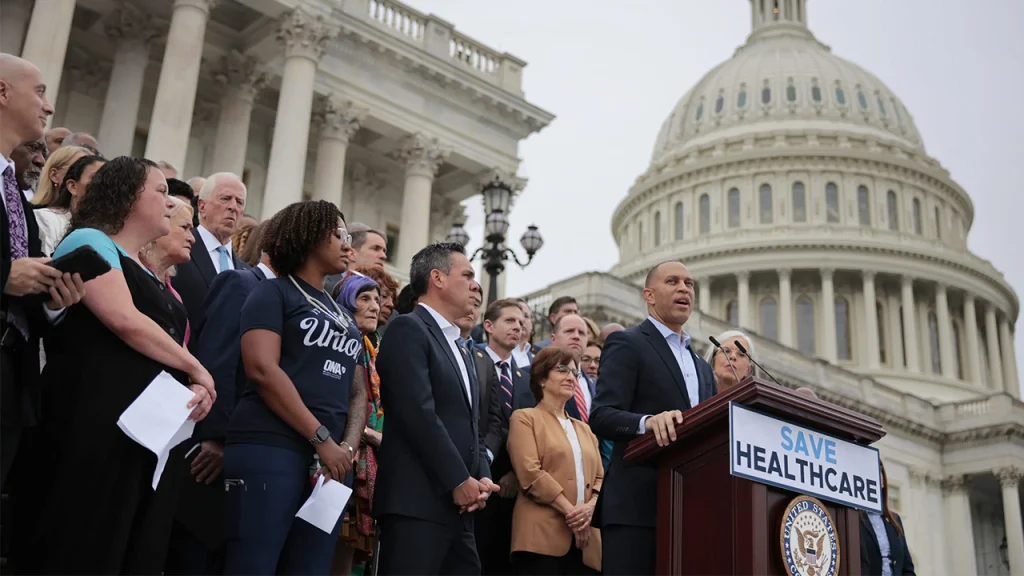Democrats Stand Firm Amid Government Shutdown, Healthcare Debate
As the government shutdown enters its third week, a clear political standoff has emerged between Democratic and Republican leadership, with federal workers and service members caught in the middle, facing missed paychecks and financial uncertainty. House Minority Leader Hakeem Jeffries (D-N.Y.) has become the face of Democratic resistance, rallying his party around healthcare priorities while refusing to yield ground to Republican demands. In communications with supporters, Jeffries has maintained his characteristic “keep the faith” sign-off while drawing a hard line: “Democrats will continue to stand up to address the Republican healthcare crisis, and we will NOT back down until it’s fixed. America deserves better.” This messaging suggests that behind-the-scenes Senate negotiations on expiring Obamacare tax credits have yet to produce meaningful progress toward ending the shutdown standoff.
The Democrats’ position appears increasingly entrenched as Jeffries forcefully pushed back against Republican pressure tactics: “Republicans thought we’d back down because of their deepfake videos, threats and lies. Not a chance. Cancel the Cuts. Lower the Cost. Save Healthcare.” This language reveals the core Democratic demands in the standoff – reversing what they characterize as Republican Medicaid cuts and extending Obamacare tax credits to maintain affordable health insurance access. Representative Dave Min (D-Calif.) echoed this sentiment in his communications, arguing these healthcare priorities “should not be controversial,” yet they’ve become the central sticking point in budget negotiations. The disagreement over healthcare provisions has transformed what might have been routine government funding into an ideological battle with real-world consequences for federal workers and Americans who depend on government services.
Democratic lawmakers have simultaneously used the shutdown as a fundraising opportunity, framing the standoff as a critical moment requiring supporter mobilization. Representative Janelle Bynum (D-Ore.) has been particularly active in this regard, telling supporters “the stakes couldn’t be higher” while soliciting donations to “keep up this critical fight for hardworking Americans.” Similarly, Bynum responded to Republican attack ads blaming her for the shutdown by asking supporters to “rush a donation now to help our team push back on National Republicans and stand up for Oregonians.” This fundraising strategy extends across the Democratic caucus, with Representative Marcy Kaptur (D-Ohio) directly requesting contributions to “stand with me against this reckless shutdown and help us take back the House next fall.” These appeals transform the immediate crisis into part of a longer-term political strategy aimed at the upcoming election cycle.
The shutdown narrative has become increasingly partisan as both sides attempt to shift blame while positioning themselves as defenders of American interests. Jeffries has characterized the Republican continuing resolution as a “partisan spending bill that continues to gut the healthcare of the American people and threatens to raise the costs of living on tens of millions of people.” This framing suggests Democrats see themselves fighting not merely for government operations but for fundamental healthcare protections they believe would be compromised by accepting Republican terms. Representative Min explicitly connected the current crisis to future political goals, writing that “if we want to stop these shutdowns from happening in the future, we need to take back control of Congress next year,” directly linking shutdown frustrations to electoral ambitions.
Behind the public messaging, the shutdown’s impacts grow more severe with each passing day. Federal workers face increasing financial pressure as payday approaches with no compensation, while government services remain curtailed or suspended entirely. The shutdown’s continuation suggests neither party sees sufficient political advantage in compromise, despite the mounting consequences for citizens dependent on government functions. The healthcare provisions at the center of the dispute represent fundamental philosophical differences between the parties regarding the government’s role in ensuring healthcare access and affordability – differences not easily resolved through typical budget negotiations.
As the stalemate continues, the silence from Republican leadership in response to Democratic messaging is notable. Neither Jeffries, Bynum, Min, nor Kaptur received immediate responses when Fox News Digital reached out to them for comment, suggesting a strategic decision to let the public rhetoric stand without additional elaboration. Meanwhile, Americans remain caught between competing political narratives about responsibility for the shutdown, with each side portraying the other as unreasonable and obstructionist. Until one side decides the political cost of continued shutdown exceeds the cost of compromise on healthcare provisions, federal workers and the public they serve will continue bearing the brunt of this political impasse – a reality that transcends partisan talking points as the shutdown’s real-world impacts intensify with each passing day.


